完整版新概念英语第一册第7 8课
[全]新概念英语第一册7课全
![[全]新概念英语第一册7课全](https://img.taocdn.com/s3/m/ebafbee1dd36a32d737581d5.png)
新概念英语第一册7课全《新概念英语》第一册第七课共有11个生词,其中核心必背单词有name ['neim] n.,what [wɔt, wɑ:t] a.& pron.什么,nationality [ˌnæʃə'næliti] n.国籍,job [dʒɔb] n.工作,keyboard ['ki:bɔ:d] n.电脑键盘,operator ['ɔpəreitə] n.操作人员和engineer [ˌendʒi'niə] n.工程师。
重点记忆name的习惯用语,what 的语序问题,以及engineer的拼写。
《新概念英语》第一册Lesson7New words and expressions1.I [ai] pron.我2.am [m, əm, æm] v.be动词现在时第一人称单数3.are [ɑ:] v.be动词现在是复数 ['neim] n.名字5.what [wɔt, wɑ:t] a.& pron.什么6.nationality [ˌnæʃə'næliti] n.国籍7.job [dʒɔb] n.工作8.keyboard ['ki:bɔ:d] n.电脑键盘9.operator ['ɔpəreitə] n.操作人员10.engineer [ˌendʒi'niə] n.工程师《新概念英语》全套单词全析全解全集(8)第一册7课《新概念英语》第一册Lesson 7 New words and expressions1.I [ai] pron.我英语中唯一一个字母为一个单词的单词。
其特点是不论在句中的什么位置都要用大写形式。
2.am [m, əm, æm] v.be动词现在时第一人称单数。
英语中谓语动词形式是有人称、时态和数的变化的。
am只有当主语是第一人称“I”,且用于一般现在时的时候才使用。
(完整版)新概念英语77课讲义

Lesson77 Terrible toothache一、单词与短语appointment: n.约会,预约;make an appointment:约会;I made an appointment with Tom on Monday.星期一我跟汤姆约会了。
urgent:adj.急切的;紧急的;till:prep.直到、、、为止;掌握与till相近的一个短语:not、、、until:直到、、、才:I did not know the truth until I met her at school.直到在学校遇见她,我才知道事情的真相;Don’t get off the bus until it has stopped.车停稳了以后再下车。
You mustn’t eat anything until you see the doctor.看过医生之后,你才能吃东西。
not、、、until是英语中一个相当重要的句型,需要掌握!二、短语句型及语法1、Do you have an appointment? 你有预约吗?在本句中需要掌握的是appointment的用法:appointment是约会、预约的意思,在英语中应用地非常广泛,关于appointment需要掌握一个常见的重要短语:have an appointment with sb:和某人有个约会I will have an appointment with my classmate tomorrow.我明天跟同学有个约会。
2、Is it urgent? 紧急吗?Urgent是“紧急的”的意思,关于urgent需要掌握一个重要的句型即可:it is urgent for sb to do sth:对某人来说做、、、是非常紧急的,例:It is urgent for me to learn English.对我来说学英语是件紧急的事情。
It is urgent for me to be accustomed to the new environment.对我来说尽快适应新环境是件紧急的事情。
新概念英语第一册L7--8课

请填空: ______ ________ a new student.
记忆:我〔I〕是am,你是are, is连着三个TA(他/她/它)
第三十一页,共57页。
1. I ___a_m____from Australia. 2. She ____is___ a student.
3. I __a_m____ at school.
第二十页,共57页。
Yes,I am.
Are you French?
第二十一页,共57页。
Are you French,too?
No,I am not.
第二十二页,共57页。
What nationality are you? I’m Italian.
第二十三页,共57页。
No,I’m not.
• What is your job? = What do you do? • a good job 一份好工作 • ★ work 工作,作名词时不可数。 • 1. n. 工作,广义的概念,泛指的劳动. 为
不可数名词。 a piece of work 一份工作 • 2. v. go to work 去上班
It/He/She is __________. 今天,学习一个新的:I am ___________.
第二十八页,共57页。
My name’s Robert. 用于自我介绍中,也可以说My name is Robert.
第二十九页,共57页。
Are you French? 你是法国的吗?
主系表结构3:You are ____________. 肯定答复:Yes, I am. (不缩写) 否认答复:No, I am not./No, I’m not.
(完整版)新概念英语第一册课文

新概念英语第一册课文*课文1 对不起! Excuse me!Whose handbag is it? 这是谁的手袋?1. Excuse me!对不起2. Yes?什么事?3. Is this your handbag?这是您的手提包吗?4. Pardon?对不起,请再说一遍。
5. Is this your handbag?这是您的手提包吗?6. Yes, it is.是的,是我的。
7. Thank you very much. (等于thanks a lot)非常感谢!课文2 Is this your……?这是你的……吗?*课文3 Sorry, sir.对不起,先生。
Does the man get his umbrella back?这位男士有没有要回他的雨伞?8. My coat and my umbrella please.请把我的大衣和伞拿给我。
9. Here is my ticket.这是我(寄存东西)的牌子。
10. Thank you, sir.谢谢,先生。
11. Number five.是5号。
12. Here's your umbrella and your coat.这是您的伞和大衣13. This is not my umbrella.这不是我的伞。
14. Sorry, sir.对不起,先生。
15. Is this your umbrella?这把伞是您的吗?16. No, it isn't.不,不是!17. Is this it?这把是吗?18. Yes, it is.是,是这把19. Thank you very much.非常感谢。
*课文4 Is this your……?这是你的……吗?*课文5 Nice to meet you.很高兴见到你。
Is Chang-woo Chinese ? 昌宇是中国人吗?20. Good morning.早上好。
21. Good morning, Mr. Blake.早上好,布莱克先生。
新概念英语第一册课文1-143
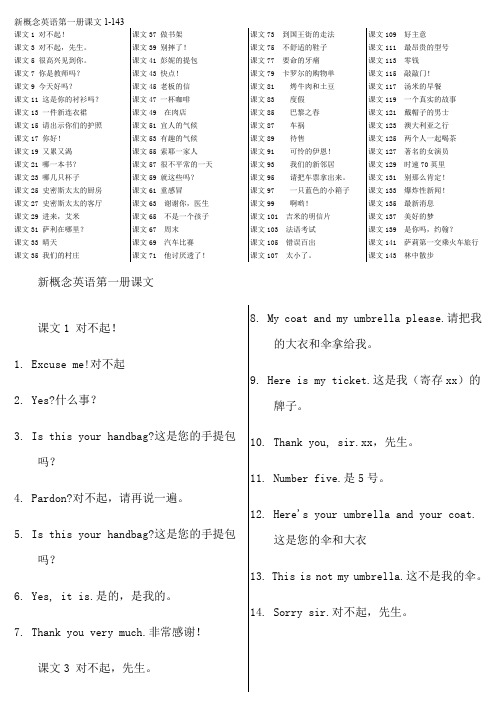
课文1 对不起!课文3 对不起,先生。
课文5 很高兴见到你。
课文7 你是教师吗?课文9 今天好吗?课文11 这是你的衬衫吗?课文13 一件新连衣裙课文15 请出示你们的护照课文17 你好!课文19 又累又渴课文21 哪一本书?课文23 哪几只杯子课文25 史密斯太太的厨房课文27 史密斯太太的客厅课文29 进来,艾米课文31 萨利在哪里?课文33 晴天课文35 我们的村庄课文37 做书架课文39 别摔了!课文41 彭妮的提包课文43 快点!课文45 老板的信课文47 一杯咖啡课文49 在肉店课文51 宜人的气候课文53 有趣的气候课文55 索耶一家人课文57 很不平常的一天课文59 就这些吗?课文61 重感冒课文63 谢谢你,医生课文65 不是一个孩子课文67 周末课文69 汽车比赛课文71 他讨厌透了!课文73 到国王街的走法课文75 不舒适的鞋子课文77 要命的牙痛课文79 卡罗尔的购物单课文81 烤牛肉和土豆课文83 度假课文85 巴黎之春课文87 车祸课文89 待售课文91 可怜的伊恩!课文93 我们的新邻居课文95 请把车票拿出来。
课文97 一只蓝色的小箱子课文99 啊哟!课文101 吉米的明信片课文103 法语考试课文105 错误百出课文107 太小了。
课文109 好主意课文111 最昂贵的型号课文113 零钱课文115 敲敲门!课文117 汤米的早餐课文119 一个真实的故事课文121 戴帽子的男士课文123 澳大利亚之行课文125 两个人一起喝茶课文127 著名的女演员课文129 时速70英里课文131 别那么肯定!课文133 爆炸性新闻!课文135 最新消息课文137 美好的梦课文139 是你吗,约翰?课文141 萨莉第一交乘火车旅行课文143 林中散步新概念英语第一册课文课文1 对不起!1. Excuse me!对不起2. Yes?什么事?3. Is this your handbag?这是您的手提包吗?4. Pardon?对不起,请再说一遍。
新概念英语第一册第81课

新概念英语第一册第81课新概念英语第一册第 81 课主要是学习"have"这个动词的用法,以及与之相关的一些常见动词的用法。
其中包括:"have"表示"做"的用法,如"haveabath"、"haveacigarette"、"haveawalk"、"havearest"等;"do"表示"做"的用法,如"dothestairs"、"dotheLaundry"等。
同时,本课还学习了常用的短语动词,如"becoming"、"goto"、"haveaccessto"等。
课文主要语言点包括:"He"supstairs"表示他在楼上;"He"shavingabath"表示他在洗澡;"Yes?"表示疑问;"I"mnearlyready"表示我马上就好了;"Haveacigarette"表示抽支烟;"Haveaglassofwhiskythem"表示喝一口威士忌;"Isdinnerready,Carol?"表示晚饭准备好了吗,Carol?;"SamandIhadlunchtogethertoday"表示今天中午我和 Sam一起吃了饭;"Wewenttoarestaurant.restaurant,饭店。
注意该词的读音,因为源于法语,所以发音特别;"Wehadroastbeefandpotatoes"表示我们吃了烤牛肉和土豆;"What"sthematter,Carol?"表示发生了什么事,Carol?;"Well,we"regoingtohaveroastbeefandpotatoesagaintonig ht!"表示那么,我们今天晚上还要吃烤牛肉和土豆。
新概念英语第一册第87-88课:A car crash

Lesson 87 A car crash车祸Listen to the tape then answer this question.Can the mechanics repair Mr. Wood's car?听录音,然后回答问题。
修理工能否修复伍德先生的汽车?Mr Wood: Is my car ready yet?伍德先生:我的汽车修好了吗?Attendant: I don’t know, sir. What’s the licence number of your car?服务员:我不知道,先生。
您的汽车牌号是多少?Mr Wood: It’s LFZ 312 G.伍德先生:是LFZ312G。
Attendant: When did you bring it to us?服务员:您什么时候送来的?Mr Wood: I brought it here three days ago.伍德先生:3天前。
Attendant: Ah yes, I remember now.服务员:啊,是的,我现在记起来了。
Mr Wood: Have your mechanics finished yet?伍德先生:你们的机械师修好了吗?Attendant: No, they’re still working on it. Let’s go into the garage and have a look at it.服务员:没有,他们还在修呢。
我们到车库去看一下吧。
Attendant: Isn’t that your car?服务员:这难道不是您的车吗?Mr Wood: Well, it was my car.伍德先生:唔,这曾是我的车。
Attendant: Didn’t you have a crash?服务员:难说您没有出车祸吗?Mr Wood: That’s right. I drove it into a lamp post. Can your mechanics repair it?伍德先生:是啊。
新概念英语第一册课文原文+精讲汇总(144课完整版)
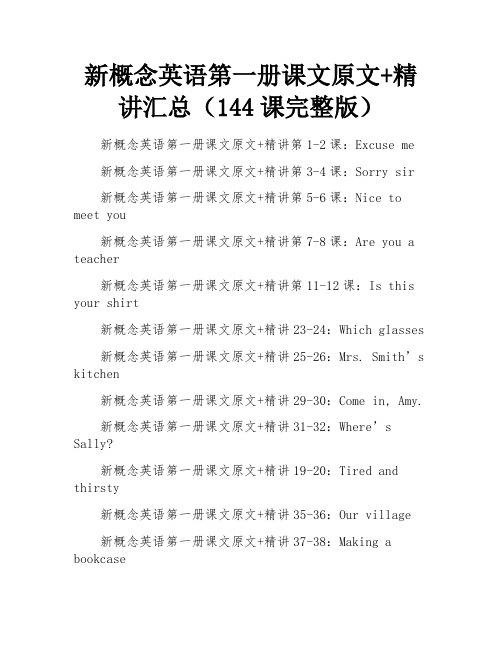
新概念英语第一册课文原文+精讲汇总(144课完整版)新概念英语第一册课文原文+精讲第1-2课:Excuse me新概念英语第一册课文原文+精讲第3-4课:Sorry sir新概念英语第一册课文原文+精讲第5-6课:Nice to meet you新概念英语第一册课文原文+精讲第7-8课:Are you a teacher新概念英语第一册课文原文+精讲第11-12课:Is this your shirt新概念英语第一册课文原文+精讲23-24:Which glasses新概念英语第一册课文原文+精讲25-26:Mrs. Smith’s kitchen新概念英语第一册课文原文+精讲29-30:Come in, Amy.新概念英语第一册课文原文+精讲31-32:Where’s Sally?新概念英语第一册课文原文+精讲19-20:Tired and thirsty新概念英语第一册课文原文+精讲35-36:Our village新概念英语第一册课文原文+精讲37-38:Making a bookcaseit!新概念英语第一册课文原文+精讲41-42:Penny’s bag新概念英语第一册课文原文+精讲33-34:A fine day新概念英语第一册课文原文+精讲43-44:Hurry up新概念英语第一册课文原文+精讲45-46:The boss’s letter新概念英语第一册课文原文+精讲47-48:A cup of coffee新概念英语第一册课文原文+精讲53-54:An interesting climate新概念英语第一册课文原文+精讲55-56:The Sawyer family新概念英语第一册课文原文+精讲57-58:An unusual day新概念英语第一册课文原文+精讲59-60:Is that all新概念英语第一册课文原文+精讲61-62:A bad cold新概念英语第一册课文原文+精讲63-64:Thank you , doctor新概念英语第一册课文原文+精讲67-68:The weekend新概念英语第一册课文原文+精讲69-70:The car race新概念英语第一册课文原文+精讲71-72:He’s awfulKing Street新概念英语第一册课文原文+精讲75-76:Unfortable shoes新概念英语第一册课文原文+精讲77-78:Terrible toothache新概念英语第一册课文原文+精讲81-82:Roast beef and potato新概念英语第一册课文原文+精讲83-84:Going on a holiday新概念英语第一册课文原文+精讲85课:Paris in the Spring新概念英语第一册课文原文+精讲87课:A car crash新概念英语第一册课文原文+精讲89课:For sale新概念英语第一册课文原文+精讲91课:Poor Ian新概念英语第一册课文原文+精讲93课:Our new neighbor新概念英语第一册课文原文+精讲95课:Ticket, please.新概念英语第一册课文原文+精讲97课:A small blue case新概念英语第一册课文原文+精讲99课:Ow!新概念英语第一册课文原文+精讲101课:A card from Jimmytest新概念英语第一册课文原文+精讲105课:Full of mistakes新概念英语第一册课文原文+精讲107课:It’s too small新概念英语第一册课文原文+精讲109课:A good idea新概念英语第一册课文原文+精讲111课:The most expensive model新概念英语第一册课文原文+精讲113课:small change新概念英语第一册课文原文+精讲115课:Knock,knock新概念英语第一册课文原文+精讲117课:Tommy’s breakfast新概念英语第一册课文原文+精讲119课: A true story新概念英语第一册课文原文+精讲121课: The man in the hat新概念英语第一册课文原文+精讲123课: A trip to Australia新概念英语第一册课文原文+精讲125课: Tea for two新概念英语第一册课文原文+精讲127课: A famous actress新概念英语第一册课文原文+精讲129课: 70 miles an hour新概念英语第一册课文原文+精讲133课: Sensational news新概念英语第一册课文原文+精讲135课:The latest新概念英语第一册课文原文+精讲139课:Is that you新概念英语第一册课文原文+精讲第141课:Sally’s first新概念英语第一册课文原文+精讲131课:Don’t be so sure。
新概念英语第一册79-80课课件
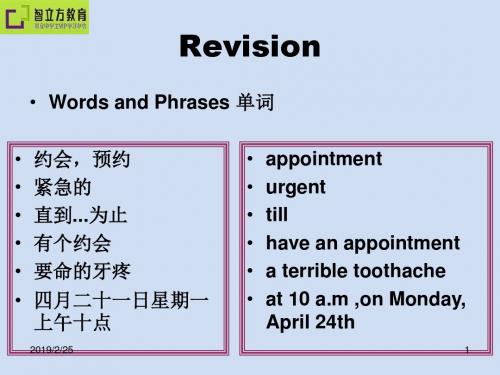
wish, hope都可作名词,可数或不可数均可, wish表示"愿望""心愿""祝愿"(不真实的东西) hope表示"希望"。 1. My wish is to become a doctor. • 我的愿望是当一名医生。 • 2. It is said that they have realized their wishes. • 据说他们已实现了他们的愿望。 • 3. I have no (not much) wish to see him. • 我并不(不大)想见他。 • 4. Send him my best wishes. • 请代我向他致意。 • 5. There is a hope of success. • 有成功的希望。 • 6. He has some hope(s) of success. • 他有成功的希望。 2019/2/25 10
出息了!敢不背书试试!
2019/2/25
29
Revision
• Words and Phrases 单词 • • • • • • 约会,预约 紧急的 直到...为止 有个约会 要命的牙疼 四月二十一日星期一 上午十点
2019/2/25
• • • • • •
appointment urgent till have an appointment a terrible toothache at 10 a.m ,on Monday, April 24th
4
2.buy(buys-bought)
• buy sb. sth.= • buy sth. for sb.
• 买某物给某人 I buy a new book for my son every week. I bought my father a coat in Paris last month.
新概念英语第一册1-8课PPT课件
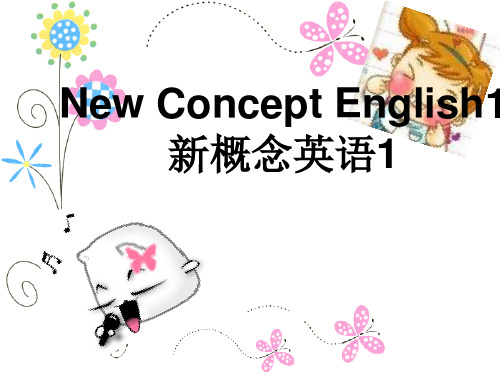
the 是定冠词表示特指 Look,look,a man is coming into the classroom. The man is our teacher. 3.and “也 ”用于肯定句中 My father and mother are very kind. also “也” 用于肯定句中 She is a teacher.I am also a teacher. too “也”,用于肯定句末 He likes playing computer games too. either “也”,用于否定句末 I don’t like eggplant either. but “但是”,表转折 They are rich.But I am poor. 4.初次见面还可以说 -How do you do? -How do you do?
9.Thank you very/somuch.=Thanks a lot. 非常感谢! You're welcome. It's my pleasure. Don't mention it.
10.this这个 that那个 these这些 those那些
Lesson 3 Sorry,Sir.
1.here这里 there那里 home 家 aboard国外 upstairs楼上 downstairs楼下 downtown市中心
地点副词前面不能用介词 eg. go home
2.My umbrella and my coat,please.省略 了动词和间接宾语(give me)的祈使句。 由一个动词原形开头的句子就是祈使句。 Let's go out and play.
新概念英语第一册79-80课课件

作业 Homework
• 1. 听79课课文4遍,并背诵课文。 • 2. 抄单词3+1+1。 • 4. 完成新概念同步练习一、三大题。 • 5. 预习81-82课,家长签字在书上。 • 10月3号来上课
背诵时刻 lesson79 上次:77课课文背写,73、74、 75单词
出息了!敢不背书试试!
• • • •
购物单 名单 黑名单 ...的清单
4.need
★ v. 需要(need sth.) Does he need to know?
★ n. 需要(物);必要 There is no need of worrying.不必担心。 我们不急需用钱。 We don’t have any urgent need for money.
疑问:
综合练习 Exercise
• 选择题
• ( )1. I want to buy many things. I must ______ this afternoon. A. going shopping B. going to shop C. go to shop D. go shopping • ( )2. Slowly! There is______traffic. A. a lot of B. many C. little D. a few • ( )3. I haven't got ______ steak. A. two B. much C. many D. few • ( )4. I haven't got many potatoes______beans. A. or B. and C. but D. too • ( )5.We haven’t got ______tomatoes . A. many B. a little C. much D. a lot
新概念英语第一册-Lesson7-8

Page
27
What are their jobs?
Page
28
doctor
teacher
student
Page
29
Word structures
Compound word - occupations 1、n.+ n. E.g. police + man hair + dresser 2、v.+ er/or E.g. teach + er visit + or
Page 16
Lesson 7 Are you a teacher?
New words
Lesson 7 1 I [ai] pron.我 2 am [m, əm, æm] v.be动词现在时第一人称单数 3 are [ɑ:] v.be动词现在时复数 4 name ['neim] n.名字 5 what [wɔt, wɑ:t] a.& pron.什么
1、特殊疑问句:特殊疑问词为标志。
2、特殊疑问词: 时间 When 人物 Who 起因 Why
地点 事件 经过
Where What
How
Page
49
Grammar Special Questions 第一类特殊疑问句: 特殊疑问词+一般疑问句? E.g. 你来自哪里? Where are you from?
Page 30
What is his/her job?
engineer nurse
He is a / an …
policeman
She is a / an …
policewoman
新概念英语第一册第79-80课-Carol’s-shopping-list

新概念英语第一册第79-80课:Carol’s shopping-list Lesson 79 Carols shopping list卡罗尔的购物单Listen to the tape then answer this question.What is Carol not going to buy?听录音,然后回答下列问题。
卡罗尔不预备买什么?Tom: What are you doing, Carol?汤姆:卡罗尔,你在干什么?Carol: Im making a shopping-list, Tom.卡罗尔:我在写购物单,汤姆。
Tom: What do we need?汤姆:我们都需要什么?Carol: We need a lot of things this week.卡罗尔:这星期我们需要许多东西。
Carol: I must go to the grocers. We havent got much tea or coffee, and we havent got any sugar or jam.卡罗尔:我得去一下食品店。
我们的茶叶和咖啡不多了,糖和果酱也没有了。
Tom: What about vegetables?汤姆:蔬菜呢?Carol: I must go to the greengrocers. We havent got many tomatoes, but weve got a lot of potatoes.卡罗尔:我还得到蔬菜水果店去一下。
我们番茄不多了,但土豆还有不少。
Carol: I must go to the butchers, too. We need some meat. We havent got any meat at all.卡罗尔:我还要到肉店去一下。
我们需要些肉。
我们一点肉也没有了。
Tom: Have we got any beer and wine?汤姆:我们还有啤酒和葡萄酒吗?Carol: No, we havent. And Im not going to get any! 卡罗尔:没有了。
新概念英语第一册71-85课后练习答案

新概念英语第一册71-85课后练习答案新概念英语第一册71-85课后练习答案Lesson71-72一.课文详注1.What's Ron Marston like, Pauline? 波琳,朗·马斯顿是怎样一个人?What is sb. like? 这一句式可用来询问某人的外貌或品行。
就本课的具体情况而言,波琳的回答更多地是指马斯顿的品行如何。
2.He telephoned me four times yesterday…他昨天给我打了4次电话……four times, 4次。
time在英语中作不可数名词时表示“时间”;作可数名词时表示“次数”。
请注意英语中次数的表示法:once 1次twice 两次three times 3次3次或3次以上通常都用基数词times表示:five times 5次thirty times 30次3.the day before yesterday, 前天。
4.answer the telephone, 接电话。
口语中也常用answer the phone。
类似的短语如:answer the door/doorbell 应声开门answer a letter回信5.She can't speak to you now! 她现在不能同你讲话!speak to sb. 意为“与某人说话”。
例如打电话时可以说:May I speak to Pauline, please?请让波琳接电话好吗?I' d like to speak to Pauline, please. 我想请波琳听电话。
6.This is Pauline's mother. 我是波琳的母亲。
This is…是英美人打电话时表示“我是……”的句式,而不说I'm…。
相关的电话用语如:This is Mary speaking.我是玛丽。
This is Edward calling from London.我是爱德华,现正在伦敦给你打电话。
新概念英语第一册73-74-76-78课课件
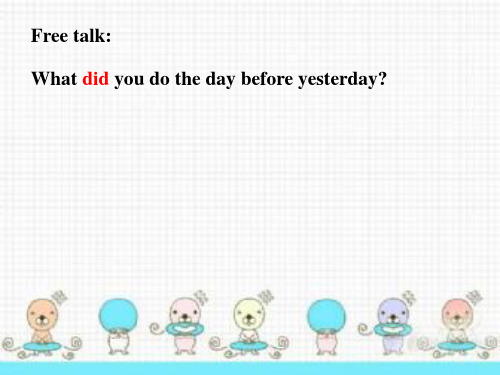
Exercise: P 156 Eg: She goes to town every day. She went to town yesterday.
P 160
Example: It's eight o'clock. When did you see him? (half an hour ago)
公共汽车站
• smile [smaɪl]
v. 微笑
• pleasantly [ˈplezntli]
adv. 愉快地
• understand [ˌʌndəˈstænd] (understood) v. 懂,明白
• speak [spiːk] (spoke)
v. 讲,说
• hand [hæ nd]
n. 手
Listen and fill in the blanks:
__L_a_s_t_w__ee_k___ Mrs. Mills went to London. She does not know London very well, and she _l_o_st_h__er__w_a_y_. __S_u_d_d_e_n_l_y__, she saw a man near a bus stop.’ I can ask him the way,’ she _s_a_id__t_o_h_e_r_s_e_lf_. ‘Excuse me,’ she said. ‘Can you tell me _t_h_e_w__a_y_t_o___ King Street, please? The man smiled p_l_e_a_s_a_n_tl_y_. He did not understand English! He spoke German. He was a _t_o_u_r_i_st_. Then he __p_u_t___ his hand _in__to__ his pocket, and took out a _p_h_r_a_se_b_o_o_k_. He opened the book and found a phrase. He read the phrase _s_lo_w__ly_.’ I am sorry,’ he said. ‘ I do not speak English.’
新概念英语第一册073-080课自学笔记(很全、很好)

新概念英语第⼀册073-080课⾃学笔记(很全、很好)Lesson 73 The way to King Streetgo went gone lose lost lost see saw seen say said said speak spoke spoken tell told toldput put put take took taken read read read find found found do did done1. She does not know London very well.know (a place) very well 对⼀个地⽅和熟悉也可以把“a place”换成“⼈”,例如:I know him very well.否定形式I don’t know the city very well.2. She does not know London very well,and she lost her way.句中的and当“所以”讲,表⽰结果。
前半句“she does not know London very well”讲的是⼀个事实,所以⽤⼀般现在时,⽽后半句“she lost her way”讲的是发⽣在上个星期的事情,所以⽤⼀般过去时。
3. and的⽤法(1)基本⽤法:单词and表⽰“和”、“⽽且”的意思,⽤来连接对等关系的字与字,短语与短语,句⼦与句⼦。
Brother and I went to the bookstore yesterday.(我和我哥哥昨天去过书店。
)I went to the Summer Palace and he went to Bei Hai Park.注意:单词或词组如果是三个以上连接,⼀般在最后的单词或词组前加and。
另外,and在译成中⽂时,不⼀定要翻译出“和”来。
(2)特别⽤法:①and⽤于祈使句中。
Use your head ,and you?ll find a way. = If you use your head,you?ll find a way.(动动脑筋,你就会想出办法来。
新概念英语第一册第7-8课PPT

单词讲解
• keyboard: computer keyboard • operator n. 操作人员 operate v. 操作 operator= operate+or 即,动词结尾+or=人
e.g 主导者director=direct指挥,指导+or
演员actor=act表演+or
课文讲解
• too“也”,用于肯定句和疑问句的句末, 用逗号和前面句子隔开; either “也”,用于否定句的句末,用逗号 和前面的句子隔开。 • e.g Miss Sophie Dupont is French, too. (变成否定句,一般疑问句) Miss Sophie Dupont isn’t French, either. Is Miss Sophie Dupont French, too?
Lesson 8 What is Robert’s job?
policeman
What’s your job? I’m a policeman.
policewoman
What’s your job? I’m a policewoman.
taxi driver
What’s your job? I’m a taxi driver.
4.What nationality are you ?你是哪国人?
回答:I’m +国籍. Eg:I’m Chinese. Where do you come from? I come from +国家. Eg:I come from China. Where are you from? I’m from+国家. Eg:I’m from China.
air hostess airnan
- 1、下载文档前请自行甄别文档内容的完整性,平台不提供额外的编辑、内容补充、找答案等附加服务。
- 2、"仅部分预览"的文档,不可在线预览部分如存在完整性等问题,可反馈申请退款(可完整预览的文档不适用该条件!)。
- 3、如文档侵犯您的权益,请联系客服反馈,我们会尽快为您处理(人工客服工作时间:9:00-18:30)。
Story time!
I
am
are
/aI/
/Am/
/B:/
name /neIm/
what nationality /wCt/ /7nAFE5nAlIti/
job /dVCb/
keyboard operator /5ki:bC:d/ /5CpEreItE/
engineer /endVI5nIE/
?I ? am ? are ? name ? what ? nationality ? job ? keyboard ? operator ? engineer
What's your job? What do you do?
What are you?
I am a nurse . I am an a ir hostess .
I am an e ngineer .
Grammar II
名 称 不定冠词a, an的用法及区别
含义 区别
可数名词单数前
开头字母辅音发音---------a 开头字母元音发音---------an
? E.g. a student an engineer
a book an operator
an hour an umbrella
elephapanpitrlehnousrtsepesosmlicilekman postummabnrheollausewife
insect
an
a
B A B
A
A
policeman milkman taxi driver
mechanic
policewoman
housewife
postman
air hostess
hairdresser
What's ____ job ? ____ is a mechanic.
Ayour , I NhomakorabeaC
B
he, He
D
his , He his, I
?
我是位教师?
What's her job? She is a housewife.
What's his job? He is a policeman.
What's his job? He is a milkman.
What's her job? She is a policewoman.
What's his job? He is an engineer.
Correct the sentences
1.what are your job? __W__h_a_t__is__y_o_u_r__jo_b__?__ 2.What nationality are your husband? __W__h_a_t__n_a_t_i_o_n_a_l_it_y__is__y_o_u_r__h_u_s_b_a__n_d_?
What are you?
I am a nurse . I am an air hostess .
I am a mechanic .
Grammar I
名? 称 结? 构
?
?
?
?
?
如何询问别人职业及应答
1)What's one's job ? — What's your job? 你的工作是什么? — I'm a doctor. 我是名医生?
n.国籍 n.工作
/5ki:bC:d/
n.电脑键盘
/5CpEreItE/ /endVI5nIE/
n.操作人员 n.工程师
What's the English? ?我 ? be动词现在时第一人称单数 ? be动词现在时复数 ? 名字 ? 什么 ? 国籍 ? 工作 ? 电脑键盘 ? 操作人员 ? 工程师
? 2)What+助动词 do/does +主语+do?
?
— What does your mother do?
?
你母亲是干什么的?
?
—She is a teacher.
?
她是一名教师?
? 3) What +系动词be+主语?
?
— What are you?
?
你是干什么的?
?
— I'm a teacher.
What do you do?
I am a hairdresser .
What do you do?
I am a nurse .
What are you?
I am an air hostess .
What are you?
I am a mechanic .
What's your job? What do you do?
Are you a teacher?
Lesson 7-8
Congratulations! We find jobs!
Can you tell me your jobs?
What's your job?
I am a postman .
What's your job?
I am a taxi driver .
B
does , He
C
do , He
D
are, He
Choose and answer: What's your job?
Transform the sentences
1. What nationality is Tom? (改为同义句) __W__h__a_t _is_T__o_m__'s__n_a_t_io_n__a_li_ty__?__ 2. What is your job? (改为同义句) __W__h__a_t _d_o__y_o_u__d_o__?__________ 3.My brother is a postman. (对画线部分提问) __W__h__a_t _is__y_o_u__r_b_r_o_t_h_e_r_'s__j_o_b_?__
What ___ she ____ ? ____ is an air hostess.
A are she , She
C do she , She
B ddooeess ddoo ,, SShhee
D is she, She
What ___ he ? ____ is a hairdresser.
A
is , He
I am are name what
/aI/ /Am/ /B:/ /neIm/ /wCt/
pron. 我 v.是(be动词现在时
第一人称单数 ) v.是,be动词现在时复数
n.名字
adj. & pron. 什么
nationality job keyboard operator engineer
/7nAFE5nAlIti/ /dVCb/
